NoSQL Databases and Their Use Cases
KDnuggets
MARCH 16, 2023
Learn about NoSQL Databases and their types like key-value, document, graph and column family with their use cases.
This site uses cookies to improve your experience. By viewing our content, you are accepting the use of cookies. To help us insure we adhere to various privacy regulations, please select your country/region of residence. If you do not select a country we will assume you are from the United States. View our privacy policy and terms of use.
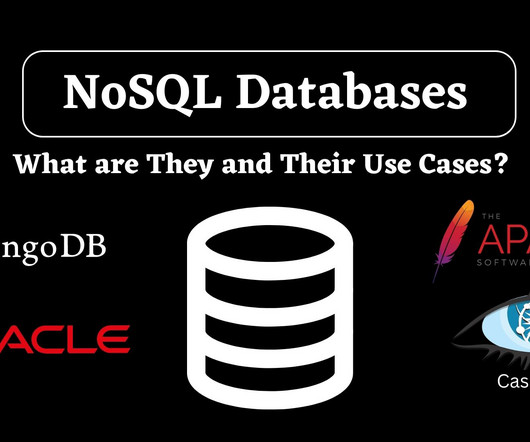
KDnuggets
MARCH 16, 2023
Learn about NoSQL Databases and their types like key-value, document, graph and column family with their use cases.
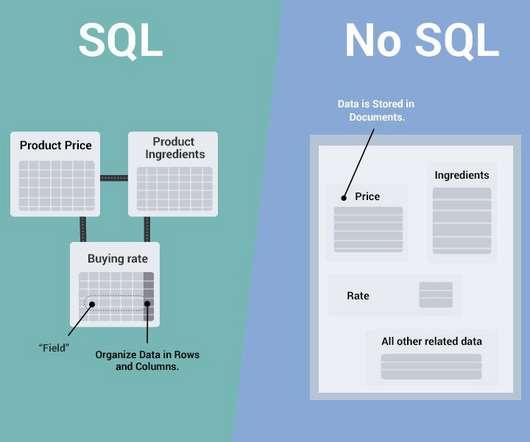
KDnuggets
SEPTEMBER 5, 2022
People assume that NoSQL is a counterpart to SQL. Instead, it’s a different type of database designed for use-cases where SQL is not ideal. The differences between the two are many, although some are so crucial that they define both databases at their cores.
This site is protected by reCAPTCHA and the Google Privacy Policy and Terms of Service apply.
The Path to Product Excellence: Avoiding Common Pitfalls and Enhancing Communication
Peak Performance: Continuous Testing & Evaluation of LLM-Based Applications
From Developer Experience to Product Experience: How a Shared Focus Fuels Product Success
Understanding User Needs and Satisfying Them
Beyond the Basics of A/B Tests: Highly Innovative Experimentation Tactics You Need to Know
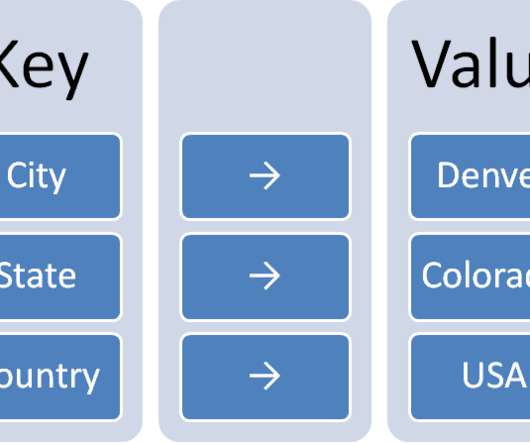
KDnuggets
OCTOBER 4, 2022
Among the four big NoSQL database types, key-value stores are probably the most popular ones due to their simplicity and fast performance. Let’s further explore how key-value stores work and what are their practical uses.
The Path to Product Excellence: Avoiding Common Pitfalls and Enhancing Communication
Peak Performance: Continuous Testing & Evaluation of LLM-Based Applications
From Developer Experience to Product Experience: How a Shared Focus Fuels Product Success
Understanding User Needs and Satisfying Them
Beyond the Basics of A/B Tests: Highly Innovative Experimentation Tactics You Need to Know
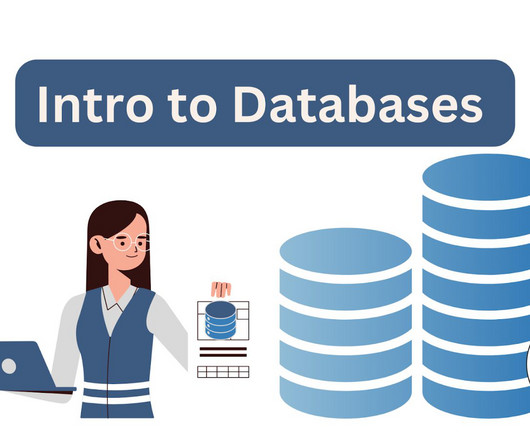
KDnuggets
SEPTEMBER 8, 2023
Understand the relevance of databases in data science. Also learn the fundamentals of relational databases, NoSQL database categories, and more.
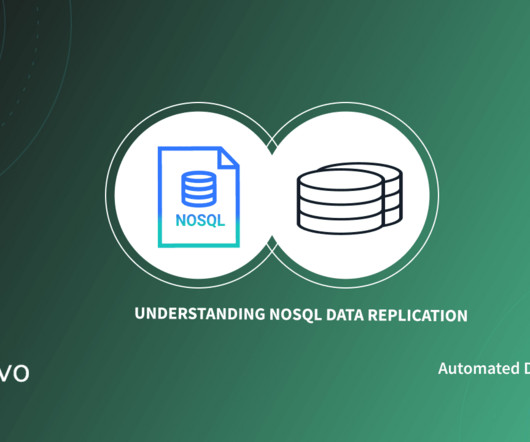
Hevo
MAY 24, 2023
This implies that traditional relational databases can not cater to the needs of organizations seeking to store and manipulate this unstructured data. Companies are therefore relying on NoSQL Databases to manage their growing consumption and generation of everyday data. NoSQL Databases […]
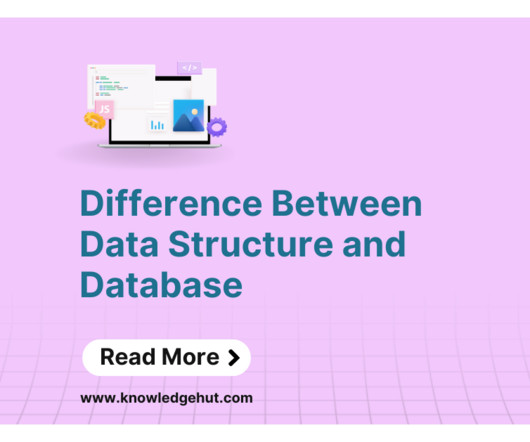
Knowledge Hut
MARCH 27, 2024
Think of a database as a smart, organized library that stores and manages information efficiently. In simpler terms, a database is where information is neatly stored, like books on shelves, while data structures are the behind-the-scenes helpers, ensuring data is well-organized and easy to find. What is a Database?
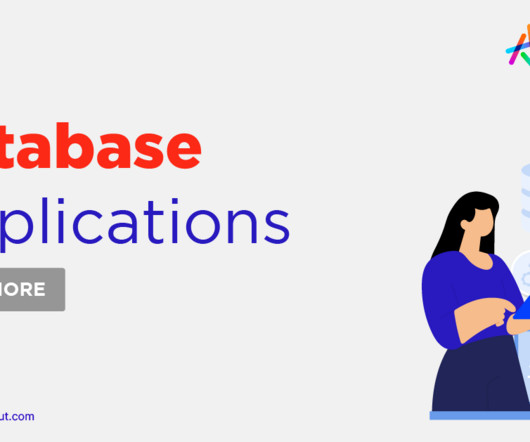
Knowledge Hut
JULY 26, 2023
Database applications have become vital in current business environments because they enable effective data management, integration, privacy, collaboration, analysis, and reporting. Database applications also help in data-driven decision-making by providing data analysis and reporting tools. What are Database Applications?
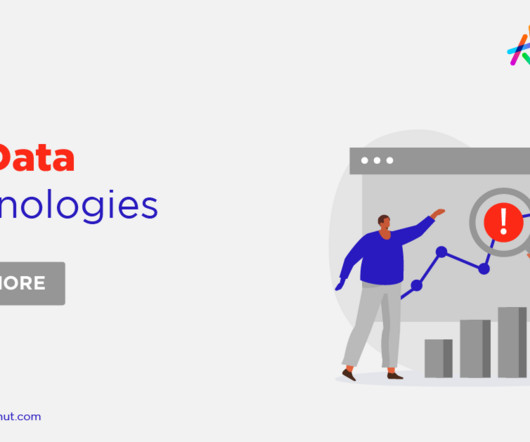
Knowledge Hut
APRIL 25, 2024
NoSQL databases are designed for scalability and flexibility, making them well-suited for storing big data. The most popular NoSQL database systems include MongoDB, Cassandra, and HBase. Big data technologies can be categorized into four broad categories: batch processing, streaming, NoSQL databases, and data warehouses.
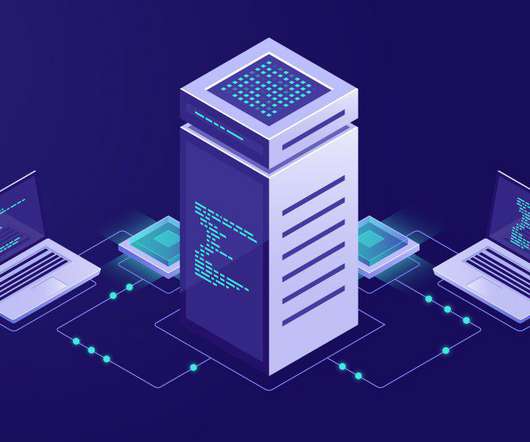
KDnuggets
FEBRUARY 15, 2022
From Oracle, to NoSQL databases, and beyond, read about data management solutions from the early days of the RBDMS to those supporting AI applications.
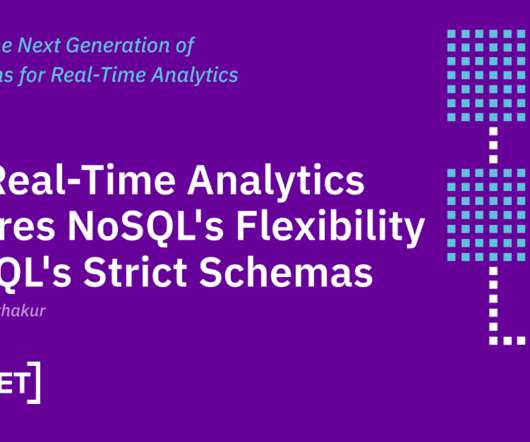
Rockset
JULY 6, 2022
Similarly, databases are only useful for today’s real-time analytics if they can be both strict and flexible. Traditional databases, with their wholly-inflexible structures, are brittle. So are schemaless NoSQL databases, which capably ingest firehoses of data but are poor at extracting complex insights from that data.

Cloudera
NOVEMBER 30, 2022
What is CDP Operational Database (COD). CDP Operational Database enables developers to quickly build future-proof applications that are architected to handle data evolution. It helps developers automate and simplify database management with capabilities like auto-scale, and is fully integrated with Cloudera Data Platform (CDP).

Data Engineering Podcast
MARCH 11, 2018
Summary As software lifecycles move faster, the database needs to be able to keep up. You first co-authored Refactoring Databases in 2006. What was the state of software and database system development at the time and why did you find it necessary to write a book on this subject?

ProjectPro
MAY 13, 2015
Table of Contents MongoDB NoSQL Database Certification- Hottest IT Certifications of 2015 MongoDB-NoSQL Database of the Developers and for the Developers MongoDB Certification Roles and Levels Why MongoDB Certification? The three next most common NoSQL variants are Couchbase, CouchDB and Redis.

Data Engineering Podcast
APRIL 22, 2019
FaunaDB is a cloud native database built by the engineers behind Twitter’s infrastructure and designed to serve the needs of modern systems. You listen to this show to learn and stay up to date with what’s happening in databases, streaming platforms, big data, and everything else you need to know about modern data management.

Cloudera
FEBRUARY 26, 2021
Cloudera Operational Database is an operational database-as-a-service that brings ease of use and flexibility to Apache HBase. Cloudera Operational Database enables developers to quickly build future-proof applications that are architected to handle data evolution. Step 2: Create a database. Get connectivity information
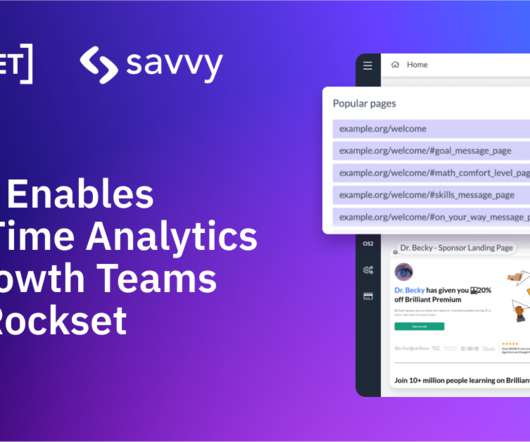
Rockset
JULY 21, 2022
All interactions are streamed in the form of semi-structured events into Firebase’s NoSQL cloud database, where the data, which includes a large number of nested objects and arrays, is ingested. QuestDB , another open-source SQL database oriented for time-series data.
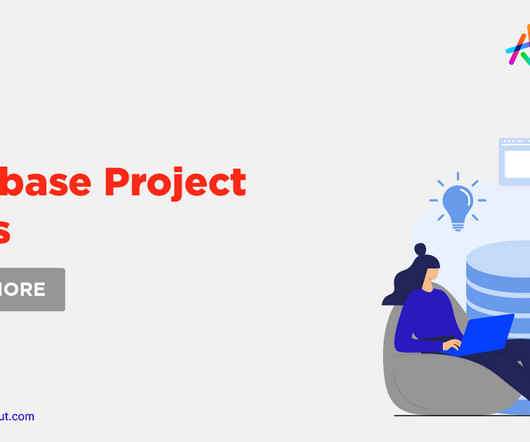
Knowledge Hut
MAY 31, 2023
This is where database management systems come in handy. A database management system (DBMS) is a software system that helps organize, store and manage information efficiently. If you want to learn more about databases, check out Knowledgehut Database course. So, let's look at some top database project ideas.
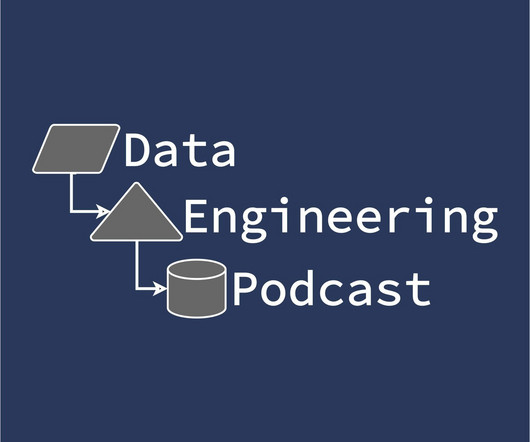
Data Engineering Podcast
APRIL 14, 2024
Summary Databases come in a variety of formats for different use cases. The default association with the term "database" is relational engines, but non-relational engines are also used quite widely. Can you describe what constitutes a NoSQL database? changed the landscape for NoSQL engines?

Data Engineering Podcast
AUGUST 19, 2018
For a substantial number of use cases, the optimal format for storing and querying that information is as a graph, however databases architected around that use case have historically been difficult to use at scale or for serving fast, distributed queries. Interview Introduction How did you get involved in the area of data management?

KDnuggets
MARCH 22, 2023
GPT-4: Everything You Need To Know • OpenChatKit: Open-Source ChatGPT Alternative • Introduction to __getitem__: A Magic Method in Python • NoSQL Databases and Their Use Cases • 7 Must-Know Python Tips for Coding Interviews

Knowledge Hut
MARCH 20, 2024
Handling databases, both SQL and NoSQL. Databases and tools: AI engineers must be adept at working with different forms of data and know how to handle SQL and NoSQL databases. Ability to contribute toward developing advanced code modules for SaaS products and ensure their integration with the business solution.

Jesse Anderson
SEPTEMBER 14, 2023
We’re going to need Vector databases. There are a wide variety of Vector databases out there. I think the data source technologies will be varied, so you’ll need RDBMS, NoSQL, and Vector databases to get the right data from the right places. This is one good example. I suggest you start learning about them now.
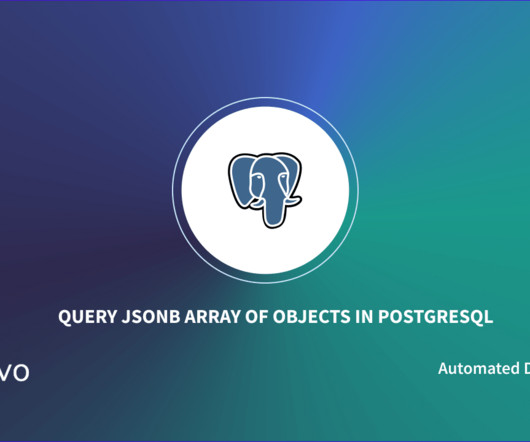
Hevo
DECEMBER 21, 2023
Do you have a NoSQL database that has no rigid shape and is causing data analysis complexity nightmares? PostgreSQL is a high-performing, open-sourced object-relational database with two JSON data storage types, JSON and JSONB. With JSON in PostgreSQL, you can have a solution to your complex problem.
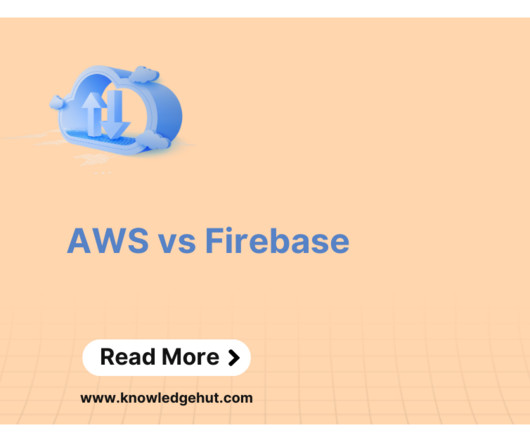
Knowledge Hut
MARCH 21, 2024
AWS: Overview AWS is a platform provided by Amazon that offers a wide range of cloud computing services such as computing, analytics, storage, networking, databases, and many more. It offers a real-time database called Cloud Firestore and handles user authentication and management. AWS has globally located data centers.

Knowledge Hut
DECEMBER 21, 2023
NoSQL This database management system has been designed in a way that it can store and handle huge amounts of semi-structured or unstructured data. NoSQL databases can handle node failures. Different databases have different patterns of data storage. Some databases like MongoDB have weak backup ability.

Christophe Blefari
OCTOBER 20, 2023
a lea prepare command that creates database objects that needs to be created (dataset, schema, etc.). Other cool features: lea teardown delete database objects, lea diff shows table schema differences and you can write Python model as long as they return a DataFrame. You can even see the traditional Jaffle shop example done in lea.

Cloudera
OCTOBER 6, 2020
The Cloudera Operational Database (COD) is a managed dbPaaS solution available as an experience in Cloudera Data Platform (CDP). It offers multi-modal client access with NoSQL key-value using Apache HBase APIs and relational SQL with JDBC (via Apache Phoenix). All code is in my github repo. Choose your environment and name your DB.

Rockset
JANUARY 23, 2020
A Brief History of Distributed Databases The era of Web 2.0 brought with it a renewed interest in database design. The new databases that have emerged during this time have adopted names such as NoSQL and NewSQL, emphasizing that good old SQL databases fell short when it came to meeting the new demands.

Knowledge Hut
DECEMBER 26, 2023
Most Popular Programming Certifications C & C++ Certifications Oracle Certified Associate Java Programmer OCAJP Certified Associate in Python Programming (PCAP) MongoDB Certified Developer Associate Exam R Programming Certification Oracle MySQL Database Administration Training and Certification (CMDBA) CCA Spark and Hadoop Developer 1.

Precisely
DECEMBER 28, 2023
In a nutshell, CDC software mines the information stored in database logs and sends it to a streaming event handler like Kafka. When someone creates a new record in the source application or makes a change to an existing record, that activity is recorded in the database log. CDC software uses that information as its raw material.

Rockset
MAY 24, 2021
Companies can also take advantage of serverless databases. Serverless databases are designed to manage workloads that are unpredictable and changing. Similar to serverless functions, you don’t manage any infrastructure or database operations. Also, often storage and compute are separated. Serverless is not limited to functions.
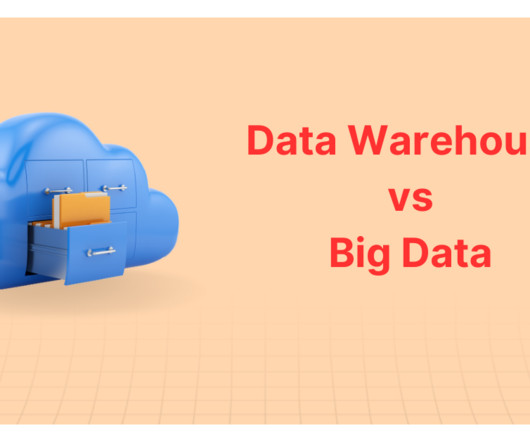
Knowledge Hut
APRIL 23, 2024
Data warehouses are typically built using traditional relational database systems, employing techniques like Extract, Transform, Load (ETL) to integrate and organize data. It employs technologies such as Apache Hadoop, Apache Spark, and NoSQL databases to handle the immense scale and complexity of big data.

Knowledge Hut
MARCH 22, 2024
Interested in NoSQL databases? MongoDB is the fourth most popular Database Management System (DBMS). Its popularity also brings a wide range of career options for people seeking to learn databases. Implementing security measures and troubleshooting database issues. If so, you need to go somewhere else.

Knowledge Hut
NOVEMBER 3, 2023
MongoDB is a NoSQL database that’s been making rounds in the data science community. With large amounts of unstructured data requiring storage and many popular data analysis tools working well with MongoDB, the prospects of picking it as your next database can be very enticing. What is MongoDB for Data Science?

Analytics Vidhya
FEBRUARY 22, 2023
Introduction Data replication is also known as database replication, which is copying data to ensure that all information remains consistent across all data resources in real-time. data replication is like a safety net that keeps your information safe from disappearing or falling through the cracks. In most cases, data alters.
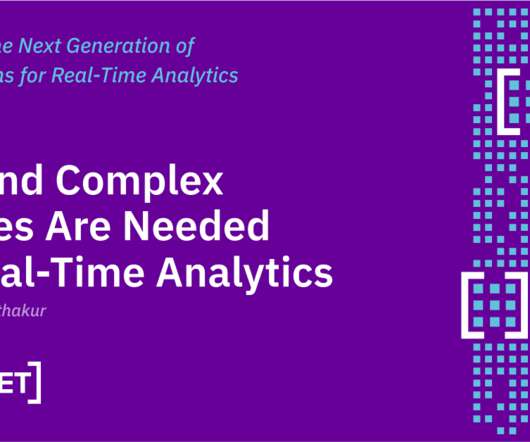
Rockset
MAY 17, 2022
Limitations of NoSQL SQL supports complex queries because it is a very expressive, mature language. That changed when NoSQL databases such as key-value and document stores came on the scene. Complex SQL queries have long been commonplace in business intelligence (BI). As a result, the use cases remained firmly in batch mode.
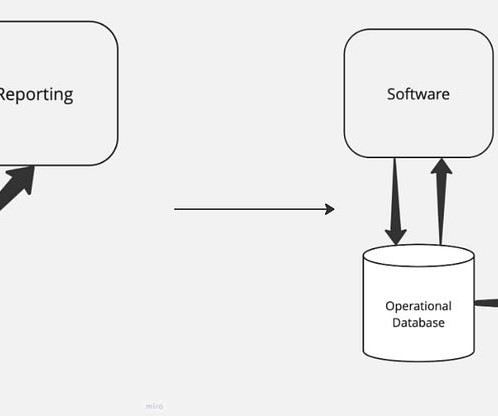
Towards Data Science
JANUARY 16, 2024
Evolution of the data landscape 1980s — Inception Relational databases came into existence. Organizations began to use relational databases for ‘everything’. Databases were overwhelmed with transactional and analytical workloads. Result: Hadoop & NoSQL frameworks emerged. So here goes my overly-simplified take.
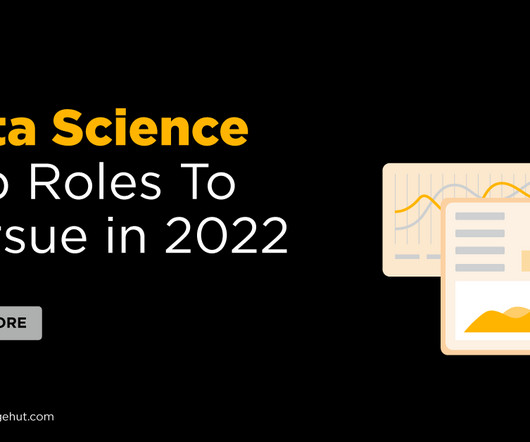
Knowledge Hut
DECEMBER 26, 2023
They also have an understanding of Database Management Systems, Online Analytical Processing (OLAP), and ETL frameworks as they are responsible for building OLAP using relational and multidimensional databases. Data Architects design, create and maintain database systems according to the business model requirements.

Edureka
FEBRUARY 8, 2024
Use cases for memory-optimized instances include- Database Servers- Applications like relational databases benefit from the higher memory capacity to store and retrieve data efficiently. These databases often require high-speed storage to deliver fast read and write operations, making I-Series instances a suitable choice.
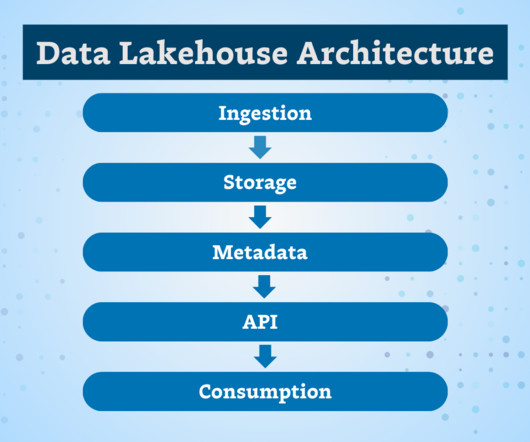
Monte Carlo
JANUARY 5, 2024
Ingestion layer The ingestion layer in data lakehouse architecture extracts data from various sources, including transactional and relational databases, APIs, real-time data streams, CRM applications, NoSQL databases, and more, and brings them into the data lake.
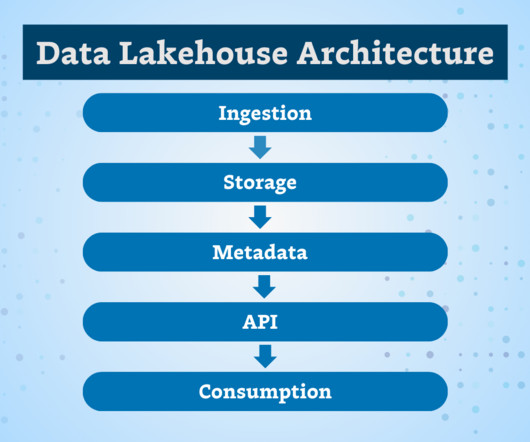
Monte Carlo
JANUARY 5, 2024
Ingestion layer The ingestion layer in data lakehouse architecture extracts data from various sources, including transactional and relational databases, APIs, real-time data streams, CRM applications, NoSQL databases, and more, and brings them into the data lake.

Rockset
OCTOBER 26, 2021
NoSQL Data Barrier The interactive dashboards include everything from basic KPIs such as Daily Active Users and Monthly Active Users (DAUs and MAUs), to advanced context interpretation for each individual patient’s progress. However, the challenge was serving Redash with SQL queries from data stored in our NoSQL database.

Knowledge Hut
JUNE 23, 2023
Let us look at the steps to becoming a data engineer: Step 1 - Skills for Data Engineer to be Mastered for Project Management Learn the fundamentals of coding skills, database design, and cloud computing to start your career in data engineering. Coding helps you link your database and work with all programming languages.

Knowledge Hut
JANUARY 9, 2024
3 Cloud Storage This unit covers cloud storage systems, their concepts, object storage (Ceph, OpenStack Swift, and Amazon S3), databases (DynamoDB, HBase, Cassandra, and MongoDB), and distributed file systems (Ceph FS and HDFS ). You can go for AWS Cloud Practitioner Certification training and boost your learning experience.
Expert insights. Personalized for you.
We have resent the email to
Are you sure you want to cancel your subscriptions?


Let's personalize your content